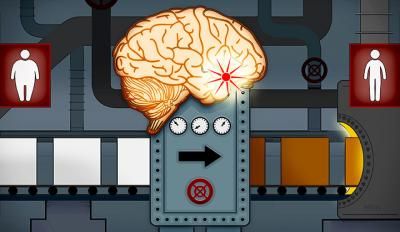Hunger games: How the brain 'browns' fat to aid weight loss
Researchers at Yale School of Medicine have uncovered a molecular process in the brain known to control eating that transforms white fat into brown fat. This process impacts how much energy we burn and how much weight we can lose. The results are published in the Oct. 9 issue of the journal Cell.

Yale researchers uncover a molecular process in the brain that controls eating by transforming white fat into brown fat.
Yale University
Obesity is a rising global epidemic. Excess fatty tissue is a major risk factor for type 2 diabetes, cardiovascular disease, hypertension, neurological disorders, and cancer. People become overweight and obese when energy intake exceeds energy expenditure, and excess calories are stored in the adipose tissues, which are made up of both white and brown fat. While white fat primarily stores energy as triglycerides, brown fat dissipates chemical energy as heat. The more brown fat you have, the more weight you can lose.
It has previously been shown that energy-storing white fat has the capacity to transform into energy-burning "brown-like" fat. In this new study, researchers from the Yale Program in Integrative Cell Signaling and Neurobiology of Metabolism, demonstrate that neurons controlling hunger and appetite in the brain control the "browning" of white fat.
Lead author Xiaoyong Yang, associate professor of comparative medicine and physiology at Yale School of Medicine, conducted the study with Tamas Horvath, professor and chair of comparative medicine, and professor of neurobiology and Obstetrics/gynecology at Yale School of Medicine, and their co-authors.
The team stimulated this browning process from the brain in mice and found that it protected the animals from becoming obese on a high-fat diet. The team then studied the molecular changes in hunger-promoting neurons in the hypothalamus and found that the attachment of a unique sugar called "O-GlcNAc" to potassium ion channels acts as a switch to control brain activity to burn fat.
"Our studies reveal white fat "browning" as a highly dynamic physiological process that the brain controls," said Yang. "This work indicates that behavioral modifications promoted by the brain could influence how the amount of food we eat and store in fat is burned."
Yang said hunger and cold exposure are two life-history variables during the development and evolution of mammals. "We observed that food deprivation dominates over cold exposure in neural control of white fat browning. This regulatory system may be evolutionarily important as it can reduce heat production to maintain energy balance when we are hungry. Modulating this brain-to-fat connection represents a potential novel strategy to combat obesity and associated illnesses."
Most read news
Topics
Organizations
Other news from the department science

Get the life science industry in your inbox
By submitting this form you agree that LUMITOS AG will send you the newsletter(s) selected above by email. Your data will not be passed on to third parties. Your data will be stored and processed in accordance with our data protection regulations. LUMITOS may contact you by email for the purpose of advertising or market and opinion surveys. You can revoke your consent at any time without giving reasons to LUMITOS AG, Ernst-Augustin-Str. 2, 12489 Berlin, Germany or by e-mail at revoke@lumitos.com with effect for the future. In addition, each email contains a link to unsubscribe from the corresponding newsletter.






















































